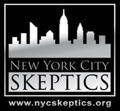About SkeptiCamp NYC
What makes SkeptiCamp different from other science conferences? You! Yes, at this event, Anyone can be a presenter. That could even include you! As long as your topic has something to do with science and/or skepticism, that is. And, these events could take place all over the world!
The New York City edition of SkeptiCamp has been running at least one event every year, since 2009. We even had one in the year 2020, albeit on the Internet intead of a physical location. But, we have since brought back live, in-person events!
"SkeptiCamp" is a weird name, because it has its roots in the old BarCamp model of "unconferences", which had focused on software and technology, even though they had nothing to do with bars, and no one camps out at them, anymore.
The Primary Rules of SkeptiCamp
As Borrowed from historic BarCamp tradition:
1. Vote with Your Feet: You are never required to stay in the room, if you don't like a talk. You can always get up and leave. If there is another session running parallel, you can try that one, instead.
2. Have Fun!
About Skepticism
That would be Scientific Skepticism, to be a little more precise! There are several good ways to define this term. The one we prefer, for our own purposes, comes from the "elevator pitch" written by Tim Farley:
Skepticism is the intersection of science education and consumer protection. We help people learn from science to avoid spending their money on products and services that do not work.
There is a Wikipedia article that is also often cited as a more general reflection of the scientifically skeptical attitude.
We do NOT use the term to deny or defy the findings of the natural sciences. For us, skepticism does NOT equal cynicism. It is more akin to the practice of critical thinking skills.
Sponsors
We are primarily sponsored by
New York City Skeptics, an all-volunteer, 501(c)3 educational nonprofit that promotes critical thinking, skeptical inquiry, and science education for the general public.

The Team
Lead organizer: Mitchell Scott Lampert, Mitch@MitchLampert.net
Assistance Also From: Jonathan Nelson, Benny Pollak, Russ Dobler, and Craig Sachs.
In the past, we've also had assistance from: Spyridon Condos, Yelena Bernadskaya, Reed Esau, Michael Feldman, Natalie Jaran, Janice Gherardi, Page Van Meter, and many others.
Misc. Facts
Very few people ever bother reading the About page of these sorts of sites. As a reward for doing so, we present you with some misc. trivia facts about the event:
- Every regional SkeptiCamp has its own, distinct logo, which usually contains a flame modeled after the BarCamp logo's flame. The "Big Apple" SkeptiCamp logo for New York City was designed by its lead organizer, Mitchell Scott Lampert. This was his very first graphic design project that didn't totally suck! Although he tends to suck at graphic design, in general, he continues to sometimes accidentally get one or two things right, in some of his other such work.
- SkeptiCamp, in general, was founded in 2009 by a fellow named Reed Esau, who saw the value of converting the BarCamp model of technology "unconferences" for the skeptic movement. The first one took place in Denver, Colorado; and was attended by over 30 people.
- Reed Esau was rewarded a Citizen's Skepticism trophy from the former James Randi Educational Foundation, for founding the event.
- Our Etymology Page covers more of its early history.
- The largest SkeptiCamp took place in Chicago, Illinois; in 2013; with about 175 participants. A lot of organizers think that is too large, since smaller crowds facilitate better discussions.
- The smallest SkeptiCamp on record was in Vancouver, British Columbia; in 2008, with 14 participants. That was probably too small.
- New York City ran its first SkeptiCamp in 2009, and 49 people attended it.
- The largest SkeptiCamp in New York City was in 2016, which had had 68 total attendees showing up. (NOT counting anyone who registered but did not actually show up.)
- The average SkeptiCamp attendance in New York City, from 2007 to 2019, is 48.5 people.
- John Rennie, former editor of Scientific American Magazine, once performed a 'Science of Martial Arts' demonstration at SkeptiCamp NYC, in 2010.
- Mitchell Scott Lampert improvised the idea of delivering the presentation remote to speakers on a Fancy Pillow, just to deviate from the very casual attitude of the rest of the event.
- The official theme song for SkeptiCamp NYC (but, not necessarily other SkeptiCamps) is a portion of the song "The Coelacanth Sighs", by George Hrab. Specifically, the part that begins at the 3:15 mark.